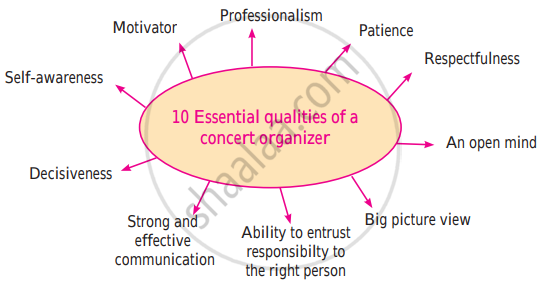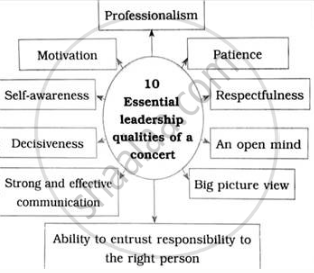Advertisements
Advertisements
प्रश्न
Look at the web diagram given below and study the traits of a good concert organizer.

उत्तर

APPEARS IN
संबंधित प्रश्न
Read the following passage and do the activities.
Smita bit her lip in self-reproach. She had been so excited at seeing the announcement, that she had not remembered that her brother was very ill. She had seen how the doctors had shaken their heads gravely and spoken words that neither she nor even her parents could understand. But somewhere deep inside Smita had known the frightening truth – that Anant was going to die. The word cancer had hung in the air – her brother was dying of cancer even though she pretended that all would be well and they would return together, a small family of four, to their home in Gaganpur. And he was only fifteen and the best table-tennis player in the school and the fastest runner. He was learning to play the sitar; they were both taking sitar lessons, but Anant was better than her as in many other things. He was already able to compose his own tunes to the astonishment of their guru. Then cancer had struck and they had come to Bombay so that he could be treated at the cancer hospital in the city.
Whenever they came to Bombay they stayed with Aunt Sushila. Her apartment was not big but there was always room for them. They had come with high hopes in the miracles of modern science. They told themselves that Anant would be cured at the hospital and he would again walk and run and even take part in the forthcoming table-tennis tournament. And, he would play the sitar-perhaps be a great sitarist one day. But his condition grew worse with each-passing day and the doctors at the cancer hospital said, ‘Take him home. Give him the thing he likes, indulge him,’ and they knew then that the boy had not many days to live. But they did not voice their fears. They laughed and smiled and talked and surrounded Anant with whatever made him happy. They fulfilled his every need and gave him whatever he asked for. And now he was asking to go to the concert. ‘The chance of a lifetime,’ he was saying. ‘When you are better,’ his mother said. ‘This is not the last time they are going to play.’ Smita stood at the window looking at the traffic, her eyes wet with tears. Her mother whispered, ‘But you Smita, you must go. Your father will take you.’ When she was alone with Aunt Sushila, Smita cried out in a choked voice, ‘No, how can I? We’ve always done things together, Anant and I.’ ‘A walk in the park might make you feel better,’ said Aunt Sushila and Smita was grateful for her suggestion.
(B1) Who said to whom. 02
(1) This is not the last time they are going to play.
(2) We have done things together.
(B2) Describe the condition of Smita and her reaction to Anant when she came to know about the concert. 02

(B3) Write the root forms of the given words from the passage. 02
1. Indulgence 2. Surroundings 3. Fulfilment 4. Happiness
(B4) Choose the appropriate adverb or adjective to fill in the gaps. 02
1. He was able to compose his own tunes. (use ‘could’ and rewrite the sentence.)
2. Smita cried out in a choked voice. (Identify the tense.)
(B5) The two contradictory pictures are depicted in the story. Describe them in your own word. 02
Pair up with your partner and ask and answer the following question.
What does a concert mean?
Who said to whom?
“We mustn’t miss the chance.”
Who said to whom?
“This is not the last time they are going to play.”
Read the following sentence and write which emotions are revealed from this sentence.
Will you come to Aunt Sushila’s house and play for him?
Read the following sentence and write which emotions are revealed from this sentence.
Did you...did you hear him?
Read the following sentence and write which emotions are revealed from this sentence.
Is it...It’s not possible?
The text mentions the names of stalwarts like Pandit Ravi Shankar and Ustad Allah Rakha. Both have earned worldwide name and fame for their outstanding contribution to the field of music. Form groups of 5 students each and write a brief note on other stalwarts in this (music) field. You can take help from your school library or search for the relevant information on the internet.
Take the help of the following points.
1. Name :
2. Field: Music
3. Specialisation: Tabla/Sitar/Violin etc.
4. Guru :
5. Early life :
6. Education :
7. Early success :
8. Contribution to the field and world :
9. Awards:
10. Any special incident that has occurred in his/her life :
Read the following passage and do the given activities:
B1. Complete the following sentences from the passage: (2)
- He was only fifteen and _______.
- Her apartment was not big but _____.
- Whenever they came to Bombay _____.
- He was already able to compose his own tunes _____.
|
Smita bit her lip in self-reproach. She had been so excited at seeing the announcement, that she had not remembered that her brother was ill. She had seen how the doctors had shaken their heads gravely and spoken words that neither she nor her parents could understand. But deep inside Smita had known the frightening truth – that Anant would die. The word cancer had hung in the air – her brother was dying of cancer even though she pretended that all would be well and they would return together, a small family of four, to their home in Gaganpur. And he was only fifteen and the best table-tennis player in the school and the fastest runner. He was learning to play the sitar; they were both taking sitar lessons, but Anant was better than her in many other things. He was already able to compose his own tunes to the astonishment of their guru. Then cancer had struck and they had come to Bombay so that he could be treated at the cancer hospital in the city. Whenever they came to Bombay they stayed with Aunt Sushila. Her apartment was not big but there was always room for them. |
B2. Why did Smita become nervous? (2)
B3. Match the pairs with proper antonyms from the passage: (2)
| A | B |
| (i) Forgotten | (a) deep |
| (ii) Misunderstand | (b) together |
| (iii) Separate | (c) remembered |
| (iv) Shallow | (d) understand |
B4. Do as directed: (2)
- He was learning to play the sitar.
[Frame 'Wh' question to get the underlined part as an answer] - He could be treated at the cancer hospital in the city.
[Pick out the modal auxiliary and state its function]
B5. Personal Response (2)
What would you prefer: music or sports? Give reasons to support your answer.
Read the following passage and complete the activities:
|
One morning in a small apartment in Bombay, a girl of about sixteen looked up from the newspaper and said excitedly, ‘Pandit Ravi Shankar’s playing tomorrow at Shanmukhananda auditorium’. ‘Sh-sh’, said her mother, pointing to the figure sleeping on the bed. ‘You’ll wake him up. You know he needs all the sleep and rest he can get.’ But the boy on the bed was not asleep. ‘Pandit Ravi Shankar!’ he said. ‘Pandit Ravi Shankar, the sitar maestro? He raised himself up on his elbows for one second and then fell back. But his eyes were shining. ‘We mustn’t miss the chance,’ he said. ‘I’ve – I’ve – always wanted to hear him and see him.’ ‘Lie down, son, lie down.’ His mother sprang to his side. ‘He actually raised himself without help,’ she murmured with a catch in her throat and her eyes turned to the idols on a corner shelf. The prayer, which she uttered endlessly, came unbidden to her lips ‘I must hear him and see him,’ the boy repeated. ‘It’s a chance of a lifetime.’ Then he began to cough and gasp for breath and had to be given oxygen from the cylinder that stood under the bed. But his large eyes were fixed on his sister. Smita bit her lip in self-reproach. She had been so excited at seeing the announcement that she had not remembered that her brother was very ill. She had seen how the doctors had shaken their heads gravely and spoken words that neither she nor even her parents could understand. But somewhere deep inside, Smita had known the frightening truth - that Anant was going to die. The word cancer had hung in the air – her brother was dying of cancer even though she pretended that all would be well and they would return together, a small family of four, to their home in Gaganpur. And he was only fifteen and the best table-tennis player in the school and the fastest runner. He was learning to play sitar; they were both taking sitar lessons, but Anant was better than her as in many things. He was already able to compose his own tunes to the astonishment of their Guru. |
(B1) State whether the given statements are true or false: (2)
- The age of the girl was six.
- The boy on the bed was fast asleep.
- Pandit Ravi Shankar was a tabla maestro.
- She had seen how the doctors had shaken their heads gravely.
(B2) Complete the following statements, giving reasons: (2)
- Anant was better than his sister in playing sitar because ______.
- The girl was excited because ______.
(B3) (2)
- Find any two adverbs from the passage ending with ‘ly’.
- Find any two compound words from the passage.
(B4) Do as Directed: (2)
- "I’ve always wanted to hear him and see him," he said.
(Change into indirect speech.) - His mother sprang to his side.
(Add a question tag.)
(B5) Personal Response (2)
Describe your experience of any musical concert that you have attended.
